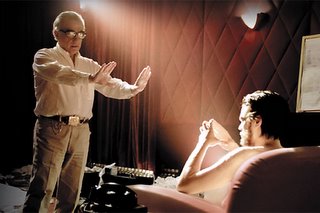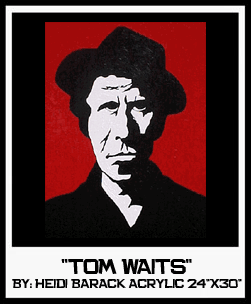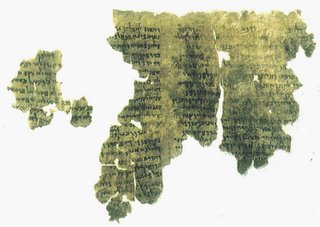Holiday Reading
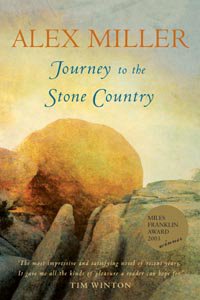 We spent four days in Bright last week, our usual sub-alpine summer holiday destination. This year we decided to stay in a cabin instead of camping, which was more expensive but less work. It wasn't quite the same however as you tend not to spend as much time out of doors. There was a fire ban on the first day of arrival but we did manage a nice campfire on the second night. I've got some nice pictures but for some reason I'm having trouble uploading them. I could, however upload the cover image of Alex Miller's Journey to the Stone Country winner of the 2003 Miles Franklin Award which segues nicely into my holiday reading report. Miller's novel, set in far North Queensland, functions as a kind of metaphor of the tenuous relationship between black and white Australians. Childhood friends Bo Renney of the Jangga tribe and Melbourne academic Annabelle Beck, recently returned to her ancestral home after a marriage bust-up, forge a new relationship based on a realistic view of their shared history. Once having stared into the face of the violence between their two families in the past they are able to set their sites on a possible shared future. The narrative drags a little in the middle section but the latter half of the book is particularly moving as both of the protagonists make discoveries about their past that force them to rearrange their present. I was attracted to the cover because I have always felt a kind of connection of some sort to monoliths. My friend Gerard Goldman at the Broken Bay Institute tells me it's part of my dreaming. Maybe so.
We spent four days in Bright last week, our usual sub-alpine summer holiday destination. This year we decided to stay in a cabin instead of camping, which was more expensive but less work. It wasn't quite the same however as you tend not to spend as much time out of doors. There was a fire ban on the first day of arrival but we did manage a nice campfire on the second night. I've got some nice pictures but for some reason I'm having trouble uploading them. I could, however upload the cover image of Alex Miller's Journey to the Stone Country winner of the 2003 Miles Franklin Award which segues nicely into my holiday reading report. Miller's novel, set in far North Queensland, functions as a kind of metaphor of the tenuous relationship between black and white Australians. Childhood friends Bo Renney of the Jangga tribe and Melbourne academic Annabelle Beck, recently returned to her ancestral home after a marriage bust-up, forge a new relationship based on a realistic view of their shared history. Once having stared into the face of the violence between their two families in the past they are able to set their sites on a possible shared future. The narrative drags a little in the middle section but the latter half of the book is particularly moving as both of the protagonists make discoveries about their past that force them to rearrange their present. I was attracted to the cover because I have always felt a kind of connection of some sort to monoliths. My friend Gerard Goldman at the Broken Bay Institute tells me it's part of my dreaming. Maybe so.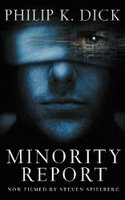 From the past to the future, I enjoyed a collection of science fiction short stories from Philip K. Dick under the title of Minority Report, no doubt to cash in on the Spielberg movie of the same name. I had read two of the stories already, the title story and "Second Variety" in another collection of stories loaned to Jesse by Jon Case - The Variable Man. Quite a few of Dick's stories, apart from "Minority Report," have been filmed. "We Can Remember it For You Wholesale" became Total Recall, "Do Androids Dream of Electric Sheep" became Ridley Scott's Blade Runner, "Paycheck" became John Woo's Paycheck, and "Second Variety," which Jesse and I thought would make a good short film, became Screamers written by Dan O'Bannon (he of Alien and Dark Star fame) - beaten to the punch again Jess. These are pretty engrossing stories. Some, like "Oh, to Be a Blobel," about a human who involuntarily tranforms into a blob-like creature, after having fought a battle with this species on the other side of the galaxy, seem like the prose equivalent of a Silver Age Marvel comic (not that there's anything wrong with that). Others like "The Electric Ant" are chilling meditations on the nature of identity - does a cyborg with programmed memories fear extinction if his memory tapes are arranged? If it does fear extinction it must have consciousness. Is it therefore a "person" with a "soul"? Science fiction writers are often credited with anticipating future technology. What strikes me about these stories however is how they fail on that point. These stories, written between 1953 and 1969, do not seem to have anticpated digital technology at all - everything is on tapes and computers are still huge devices housed in separate buildings!
From the past to the future, I enjoyed a collection of science fiction short stories from Philip K. Dick under the title of Minority Report, no doubt to cash in on the Spielberg movie of the same name. I had read two of the stories already, the title story and "Second Variety" in another collection of stories loaned to Jesse by Jon Case - The Variable Man. Quite a few of Dick's stories, apart from "Minority Report," have been filmed. "We Can Remember it For You Wholesale" became Total Recall, "Do Androids Dream of Electric Sheep" became Ridley Scott's Blade Runner, "Paycheck" became John Woo's Paycheck, and "Second Variety," which Jesse and I thought would make a good short film, became Screamers written by Dan O'Bannon (he of Alien and Dark Star fame) - beaten to the punch again Jess. These are pretty engrossing stories. Some, like "Oh, to Be a Blobel," about a human who involuntarily tranforms into a blob-like creature, after having fought a battle with this species on the other side of the galaxy, seem like the prose equivalent of a Silver Age Marvel comic (not that there's anything wrong with that). Others like "The Electric Ant" are chilling meditations on the nature of identity - does a cyborg with programmed memories fear extinction if his memory tapes are arranged? If it does fear extinction it must have consciousness. Is it therefore a "person" with a "soul"? Science fiction writers are often credited with anticipating future technology. What strikes me about these stories however is how they fail on that point. These stories, written between 1953 and 1969, do not seem to have anticpated digital technology at all - everything is on tapes and computers are still huge devices housed in separate buildings! Finally, I have almost completed a book my daughter Ellen recommended to me. First They Killed My Father: A Daughter of Cambodia Remembers by Loung Ung tells the horrific tale of the survival of a young Cambodian girl whose middle class educated family members are targetted by the Pol Pot regime as enemies of the state. It's a harrowing first-person account of one of the worst incidences of genocide from that most bloodthirsty of centuries - the 20th.
Finally, I have almost completed a book my daughter Ellen recommended to me. First They Killed My Father: A Daughter of Cambodia Remembers by Loung Ung tells the horrific tale of the survival of a young Cambodian girl whose middle class educated family members are targetted by the Pol Pot regime as enemies of the state. It's a harrowing first-person account of one of the worst incidences of genocide from that most bloodthirsty of centuries - the 20th.
